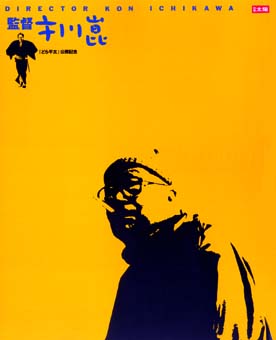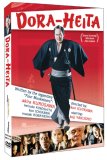| Reviews & Columns |
|
Reviews DVD TV on DVD Blu-ray 4K UHD International DVDs In Theaters Reviews by Studio Video Games Features Collector Series DVDs Easter Egg Database Interviews DVD Talk Radio Feature Articles Columns Anime Talk DVD Savant Horror DVDs The M.O.D. Squad Art House HD Talk Silent DVD
|
DVD Talk Forum |
|
|
| Resources |
|
DVD Price Search Customer Service #'s RCE Info Links |
|
Columns
|
|
|
Dora-Heita
One of their unmade projects was eventually produced as Dora-Heita (2000), directed by Kon Ichikawa, who by this time was the group's sole survivor. (He was a mere 84 years old at the time; he has since gone on to direct five more films, including a 2006 remake of his The Inugamis.) The screenplay is credited to all four directors, who supposedly were planning on directing the film jointly, though it's hard to imagine how this might have been done.
"At a certain small fief," the opening title card informs us, a new magistrate had been scheduled to assume his duties, but after 10 days has failed to show. Koheita Mochizuki (Koji Yakusho) is preceded by a bad reputation for debauchery. Indeed, his nickname is Dora-heita, or "Alley Cat." It's quickly revealed that Koheita has been ordered to clean up Horisoto, the fief's red-light harbor district, which is overrun with thieves, kidnappers and murderers, though the tax revenue from smuggling, gambling, and prostitution is also the fief's main source of revenue. By pretending to be utterly incompetent and disrespectful of authority, Koheita reasons, he can quietly size up and investigate the corruption by both the criminals and within the local government.
With Koheita armed with a royal command giving him absolute authority in such matters, the fief's senior chamberlain (Hideji Otaki, Takeshi Kato, and Dodes'ka-den's Noboru Mitani among them) can do nothing, while the district's main oyabun ("gang boss"), Nadahachi (Bunta Sugawara), watches helplessly as his cohorts are brought down one-by-one.
With its morally ambiguous warrior rogue hero, Dora-Heita's screenplay most closely resembles Kurosawa's Yojimbo (1961) and Sanjuro (1962), and like those films was based on a novel by Shugoro Yamamoto. Cinematically, Ichikawa's film is nothing like Kurosawa's classics, though in some respects it resembles his later chamber-like pieces made after Ran and bears his humanist stamp. Mostly it's like Ichikawa's later films, such as the much-superior Ka-chan (2001; it was given the unfortunate international title Big Mama). Ichikawa was hardly known for his samurai films, while star Koji Yakusho was likewise a relative neophyte when it came to carrying a big chambara / jidai-geki-type film, and therein lies its basic problem.
Though unquestionably one the best of this generation's Japanese film actors, Yakusho (The Eel, Cure, Shall We Dance?) is all wrong for the part of Dora-heita. It's hard watching the film not to imagine what an actor like Toshiro Mifune might have done in the role. Compared to him, Yakusho totally lacks the ability to project the moral ambiguity of the character and simply doesn't have the kind of commanding screen presence to bring it off. Though Yakusho probably is more diversely talented an actor than Mifune, he comes off here too low-key and not at all intimidating when he needs to be.
Ichikawa handles the film's comedy well, but its scattered bits of action are unimpressively choreographed and made worse by the director's choice of angles. He favors tight shots that are so cramped it's hard to make out what's going on and keep track of spatial relationships during the big swordfights. In one scene Dora-heita battles several dozen men single-handedly, but the editing and close-ups obscure the fact that he's deliberately not cutting the men down, that Dora-heita is using the dull side of his sword.
Though fairly well produced, the film's score is another debit; the synthesizer cues would be more appropriate in a Dolph Lundgren thriller than this.
Conversely, the film's humor and general deconstruction of the samurai myth and all its ceremonial and pecking order aspects is extremely well done, and the supporting cast, including actors associated with one or more of the four screenwriter directors, is excellent. There's lots of wryly humorous dialogue: "Just as every house needs a toilet," Otaki's character notes pragmatically, "The world needs its share of filthy places." Besides Kato, Otaki, et. al., Kyoko Kishida turns up briefly as a saucy gambler.
Video & Audio
Dora-Heita seems to source the same soft but adequate master used for the Region 2/NTSC Japan DVD release, though with new English subtitles. Ichikawa's later films favor desaturated, muted colors, so in that regard the film's colors are correctly presented. The 1.77:1 enhanced widescreen image approximates its original 1.85:1 theatrical release. The Japanese only audio (the theatrical release was in DTS Stereo in Japan) is modest but reasonably good.
The English subtitles are multi-colored, allowing viewers to keep track of who's saying what, and that's especially helpful here as the film has a greater than average amount of overlapping dialogue. As with other AnimEigo releases, a second subtitle option offers English that's limited to signs, banners, and the like, while various historical terms are annotated with even more text. All the credits are subtitled, which is welcome, though the use of anachronistic slang ("We're so screwed!" and the use of the term "bro'" among others) is jarring.**
Extra Features
Supplements are limited to a few production notes, an okay image gallery and two teaser trailers, both in 4:3 matted format.
Parting Thoughts
All complaints aside, Dora-Heita is worth seeing for its historical value alone, as a nearly forgotten screenplay by four great postwar filmmakers, one of whom, at 92, is still plugging away. The film has a lot of problems, but is witty enough to stand on its own. Recommended.
** AnimEigo's Robert Woodhead writes, "Thanks for the review. One comment though. You were concerned about anacronisms in the subtitles. We are actually very careful about such things. 'Brother' in particular is yakuza slang (Aniki) and we usually shorten it to Bro when it's used informally, because 'Brother' doesn't convey the right emotion. Also, sometimes the characters are speaking in anacronisms! Not that we're perfect, but we do try really hard on stuff like that. Our goal is that the western viewer get the same emotional experience from the film as a native Japanese-speaker."
Film historian Stuart Galbraith IV's most recent essays appear in Criterion's new three-disc Seven Samurai DVD and BCI Eclipse's The Quiet Duel.
|
| Popular Reviews |
| Sponsored Links |
|
|
| Sponsored Links |
|
|
| Release List | Reviews | Shop | Newsletter | Forum | DVD Giveaways | Blu-Ray | Advertise |
|
Copyright 2024 DVDTalk.com All Rights Reserved. Legal Info, Privacy Policy, Terms of Use,
Manage Preferences,
Your Privacy Choices | |||||||














